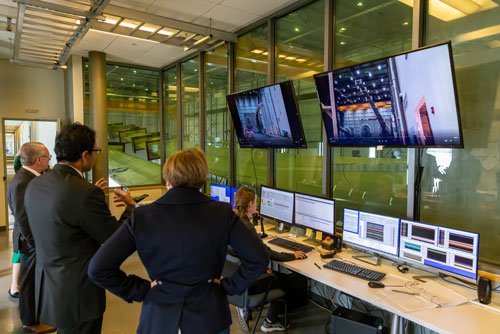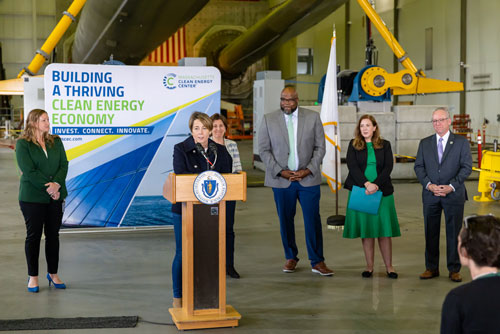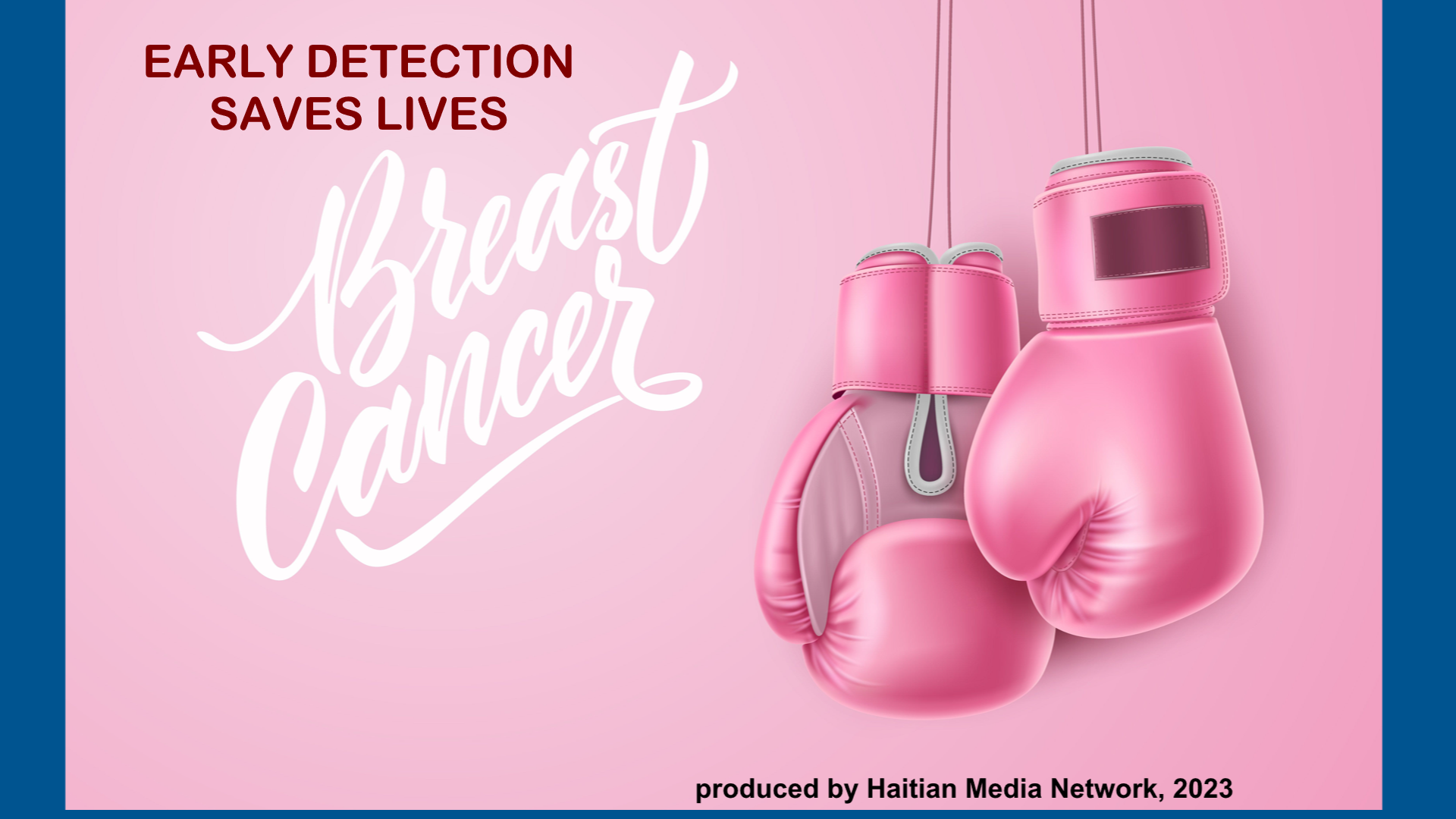Pathway Will Develop the Next Generation of Clean Energy Leaders and Meet the Workforce Needs of the Growing Renewable Energy Sector
Charlestown – Governor Maura T. Healey today announced that her administration is creating a new Clean Energy Innovation Career Pathway to allow high school students to get applied, hands-on learning opportunities in the renewable energy sector, a growing high-demand industry across Massachusetts. Governor Healey made this announcement at Massachusetts Clean Energy Center’s (MassCEC) Wind Technology Testing Center, the only facility in North America capable of testing the latest in blade technology, and one of the many clean energy employers in Massachusetts.
 “This new Clean Energy Innovation Career Pathway will open pathways for students to explore a future in the critical renewable energy sector by allowing them to work with cutting-edge employers in the field like the Massachusetts Clean Energy Center and their Wind Technology Testing Center,” said Governor Maura Healey. “Together, we’ll train the next generation of clean energy leaders and meet the workforce needs of the growing renewable energy sector – powering our efforts to remain a global leader in this industry. This new pathway is a win for students, a win for clean energy, and a win for the state.”
“This new Clean Energy Innovation Career Pathway will open pathways for students to explore a future in the critical renewable energy sector by allowing them to work with cutting-edge employers in the field like the Massachusetts Clean Energy Center and their Wind Technology Testing Center,” said Governor Maura Healey. “Together, we’ll train the next generation of clean energy leaders and meet the workforce needs of the growing renewable energy sector – powering our efforts to remain a global leader in this industry. This new pathway is a win for students, a win for clean energy, and a win for the state.”
“As we look to increase career and college readiness opportunities for every student in Massachusetts, we want to strategically target high-demand industries like clean energy,” said Lieutenant Governor Kim Driscoll. “As co-chair of the STEM Advisory Council, I’m thrilled that we can expand learning opportunities in clean energy, a vital STEM sector.”
The Executive Office of Education and the Department of Elementary and Secondary Education partnered with the Massachusetts Clean Energy Center to design the new Clean Energy Innovation Pathway to inspire the next generation of clean energy experts in Massachusetts by providing students experiential learning opportunities in the field. This will help meet the workforce needs of the Commonwealth’s booming clean energy economy – since 2010, the clean energy industry has grown by 73%, which accounted for more than 14% of all net jobs created in the state during that time. Currently, there are over 104,000 clean energy workers in Massachusetts today, all of whom play a crucial role in Massachusetts’ current economy and future health and prosperity.
“Adding the Clean Energy pathway is one way we can transform the traditional high school experience by creating more opportunities for enhanced work-based learning and by delivering more engaging and relevant coursework in a forward-looking field,” said Education Secretary Patrick Tutwiler. “Today we had the opportunity to learn about the importance of Clean Energy and it’s future workforce at Massachusetts Clean Energy Center, and see firsthand how this career path will open doors to successful careers for Massachusetts’ students.”
“Our workforce development efforts are at the heart of our clean energy transition,” said Energy and Environmental Affairs Secretary Rebecca Tepper. “We need to support and grow the workforce that will electrify our homes, construct our resiliency projects, and build our wind and solar energy. Starting in high school with the new Clean Energy Innovation Career Pathway will be critical to meeting this moment.”
“Green jobs account for a significant portion of recent and future job growth across the Commonwealth, and this new Innovation Career Pathway will connect high school students with employer partners to help build a sustainable clean energy workforce pipeline,” said Lauren Jones, Secretary of Labor and Workforce Development. “The Commonwealth benefits when young people gain access to education, training, employment, and career pathways.
“Introducing students to clean energy careers early in their education journey is critical to meeting Massachusetts’ decarbonization goals, and it’s a key part of the Healey-Driscoll Administration’s commitment to sustainability,” said MassCEC CEO Jennifer Daloisio. “MassCEC is proud to partner in this longstanding program. By inspiring and educating the next generation of clean energy professionals, we are ensuring that Massachusetts remains a leader in the clean energy economy for years to come.”
“The Clean Energy Innovation Pathway will help engage students in the environmental challenges and opportunities in the world around them,” said Elementary and Secondary Education Commissioner Jeffrey C. Riley. “Like the other Innovation Career Pathways, it will also help show students the relevance of their academic work and outline a career path.”
The Department of Elementary and Secondary Education will help develop Clean Energy Innovation Pathway pilot programs at 6 to 10 public high schools in the coming school year. The pilot programs will lead to the development of implementation tool kits and best practices that can then be adopted by other high schools, with the goal of awarding the first cohort of Clean Energy Innovation Pathway designees ahead of the ’24-’25 school year, so students can enroll by the start of the ’25-’26 school year.
The announcement is part of the Healey-Driscoll administration’s commitment to “reimagining high school” by improving equitable access to more engaging and dynamic coursework that better prepares students for their future, whether that be college or a career. The new Clean Energy Pathway is the 6th pathway in the Innovation Career Pathway program, joining the other high-demand industry sector options of Advanced Manufacturing, Information Technology, Environmental and Life Sciences, Health Care and Social Assistance, and Business and Finance. Innovation Career Pathways are designed to lead students to opportunities for meaningful careers in the relevant industry sector upon their completion of needed postsecondary education and training.
This new Innovation Career Pathway is just the latest step in the Healey-Driscoll’s buildout of the program. Last month, Governor Healey announced new Innovation Career Pathway programs had been awarded to 27 high schools, expanding the program to reach nearly 1 in 5 public high schools in the state, and added nine new Early College programs. This growth will continue into FY24, with Governor Healey and Lieutenant Governor Driscoll’s FY24 budget proposing nearly $47 million for Early College and Innovation Career Pathways, a $14.4 million increase from FY23.




